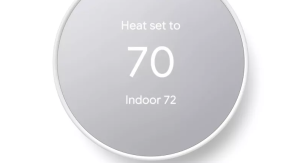by Dennis Crouch
The U.S. Court of Appeals for the Federal Circuit has granted Google's en banc rehearing in EcoFactor, Inc. v. Google LLC, No. 2023-1101 (Fed. Cir. Sept. 25, 2024), focusing on the admissibility of expert testimony regarding patent damages. This will be the first en banc utility patent case since 2018.
The order vacates the panel's previous decision that had sided with the patentee and calls for new briefing on: whether the district court properly applied Federal Rule of Evidence 702 and Daubert v. Merrell Dow Pharmaceuticals, Inc., 509 U.S. 579 (1993), in allowing testimony from EcoFactor's damages expert. The court has set a tight briefing schedule, with Google's opening brief due in 45 days, EcoFactor's response due 45 days later, and Google's reply due 30 days after that. Notably, the court is also welcoming amicus briefs without requiring consent or leave. This is an important case to the patent community. Under eBay and its progeny, equitable remedies are already tightly limited, and this case is looking to similarly tie-down damages theories to prevent large damage awards and provide further mechanisms to allow a judge to decide the outcome rather than a jury.
I begin this post with pessimism about the fundamental inquiry into patent damages. In most cases, I see patent damages as inherently speculative. The law's hypothetical negotiation to reach a reasonable royalty is a counter-factual endeavor set so far apart from reality that its results have little real meaning. In typical infringement cases, there is no overlap between amounts acceptable to either party. The baseline for a hypothetical royalty is typically determined by what the court would likely award in damages. However, this creates a circular problem, as the court's award is itself based on the hypothetical royalty. This circularity makes it challenging to establish a truly objective starting point for damage calculations. Even when we have evidence of prior licenses -- those tend to be in wholly different scenarios where the patents have not yet been adjudged enforceable and infringed. This distinction is important because every case I have encountered at the licensing stage includes credible arguments from the potential licensee that the patent is either not-enforceable or not-infringed. Thus, although I see the hypothetical negotiation as a useful tool, our attempts to tightly align the historical fiction with the actual practice of patent licensing simply does not provide a real answer as to the results of such a hypothetical negotiation.
The inherent speculativeness of the hypothetical negotiation relates directly the Daubert standard and Rule 702. In particular, the law requires that expert testimony on damages be based upon "reliable principles and methods." And, I would reject any approach that, because of the difficulty in providing this evidence, would place a heightened burden on patentees to show they are deserving of a damage award associated with adjudged infringement. At the same time, we have to recognize that damages experts are paid large rates because they are compelling witnesses - and there are many examples of experts using their persuasive skills to convincingly present dubious methodologies or unsupported conclusions as scientific fact. The limits imposed by Rule 702 serve a crucial purpose in this context. The gatekeeping function of the court under Daubert is particularly important in patent cases, where the technical complexity of the subject matter and the large sums at stake can make jurors especially susceptible to well-presented but potentially flawed expert opinions. This is not an emperor's new clothes situation where a child can easily see the nakedness. The intricate patterns of economic theories, market analyses, and technical valuations woven by damages experts can be so sophisticated that even experienced judges and attorneys may find it challenging to identify flaws or inconsistencies.
To continue reading, become a Patently-O member. Already a member? Simply log in to access the full post.
